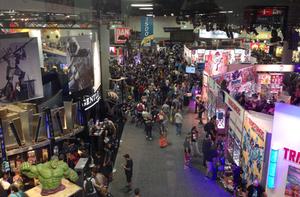 This past weekend, fans of comic books, video games, anime and manga descended on San Diego, Calif., for Comic-Con: International. From July 21-24, more than 100,000 people walked the show floor, attended panels, dressed in cosplay and waited in sometimes unbelievable lines for a chance to meet their favorite celebrities or take home exclusive merchandise. Here are a few highlights:
This past weekend, fans of comic books, video games, anime and manga descended on San Diego, Calif., for Comic-Con: International. From July 21-24, more than 100,000 people walked the show floor, attended panels, dressed in cosplay and waited in sometimes unbelievable lines for a chance to meet their favorite celebrities or take home exclusive merchandise. Here are a few highlights:
In a panel celebrating the 10th anniversary of First Second Books, an all-ages graphic novel imprint of Macmillan, editorial director Mark Siegel recalled how the process of pitching graphic novels to the Big Five (then the Big Six) changed more than a decade ago. Around that time, Siegel explained, two aspects of the boom in manga sales made New York publishers much more receptive to graphic novels than they had been: for one, "millions" were being made, but not by traditional publishers; and second, comic readership was undergoing a profound demographic change from a predominantly male, aging readership to a younger, more diverse and female readership. According to Siegel, Macmillan CEO John Sargent did not need much convincing. He looked at the material Siegel had prepared and said: "Okay."
During the same panel, librarian Eva Volin, supervising children's librarian at the Alameda Free Library, Alameda, Calif., talked about the job of collecting books for an entire community and the saying among librarians that a good library will have something in it to offend everyone. "If you're doing your job," said Volin, "that's true." She added that librarians can tell if a book is particularly popular or controversial when it gets stolen at a high rate.
---![]() Margaret Atwood was at Comic-Con on Friday morning to discuss her upcoming graphic novel, Angel Catbird (Dark Horse Books, September 6). After fellow panelist Joëlle Jones (Lady Killer) mentioned borrowing and reading her brother's Punisher comics as a child, Atwood cut in to say that she had never heard of the Punisher before and asked: "Is he an S&M character?" And when told that he wears a black shirt with a white skull on it, she wondered, "And is that all?"
Margaret Atwood was at Comic-Con on Friday morning to discuss her upcoming graphic novel, Angel Catbird (Dark Horse Books, September 6). After fellow panelist Joëlle Jones (Lady Killer) mentioned borrowing and reading her brother's Punisher comics as a child, Atwood cut in to say that she had never heard of the Punisher before and asked: "Is he an S&M character?" And when told that he wears a black shirt with a white skull on it, she wondered, "And is that all?"
---
During a panel for those curious about becoming a comic book retailer, Wayne Winsett, owner of Time Warp Comics in Boulder, Colo., said the comics industry is currently going through a "Golden Age," adding, "It is a great time to be a retailer."
Chris Powell, v-p of retailer services at Diamond Comic Distributors, said that he had recently given a presentation to some comics retailers about how best to prepare themselves for retirement and ensure that their stores are in good hands. When he first got into the business, Powell recalled, no one would have thought they could do well enough to retire from it.
Later on, the panelists also discussed the difficulty of retaining and advancing good staff. Said Winsett: "Unless you can pay them very, very well," or there are sufficient advancement opportunities, staff members are going to "use [the job] as a stepping stone."
---
 |
|
| Mysterious Galaxy's Comic-Con booth | |
Late on Friday, several manga publishers convened to discuss the state of manga in the U.S. Across the industry, manga sales are up; the last time publishers saw such growth, noted moderator Deb Aoki, the manga market soon collapsed. She wondered whether there might be another "manga bubble" forming.
Kurt Hassler, publisher and managing director of Yen Press, and formerly the manga buyer at Borders Books & Music, rejected the idea that a bubble was what caused the collapse, saying that the market had not been artificially inflated. Stu Levy, founder of Tokyopop, argued that there had been an "arms race of manga titles," with too much product for the American market. Erik Ko, CEO of Udon Entertainment, agreed that too many titles were released too fast. But perhaps the biggest reason for the collapse, he recalled, was the closure of Borders in 2011. After that, he said, publishers "lost half of our sales."
On the subject of how best to get manga into more stores, the publishers agreed that buyers could be overwhelmed and that education was key, not just for buyers but also for consumers. Ko advised telling customers to tell their local stores that they want manga. Hassler noted that it ultimately came down to the motivation of a particular buyer or store owner. It may be tough to initially stock manga, he said, but "you will never have a more loyal customer than a manga fan." --Alex Mutter

